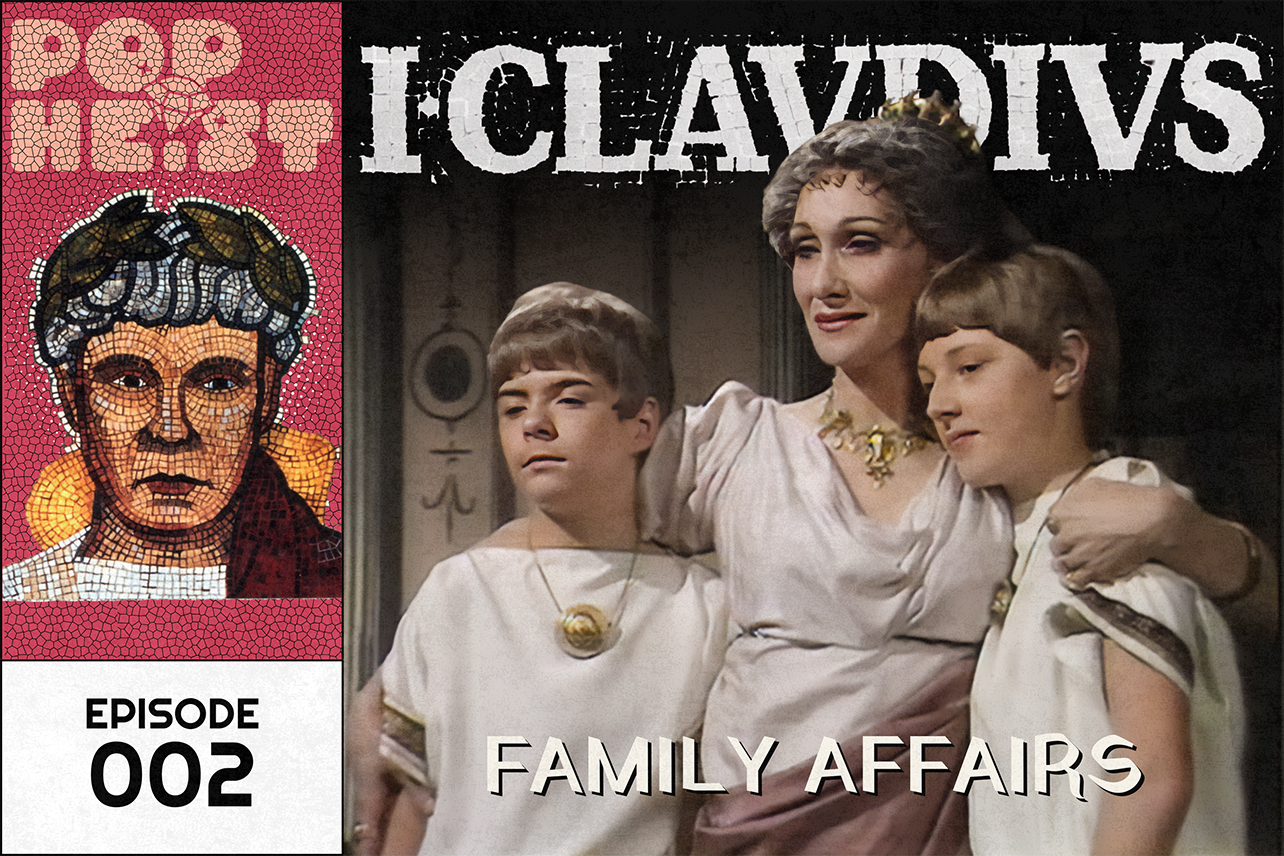In PRESTIGE PREHISTORY, Pop Heist critic Sean T. Collins takes a look at classic TV shows that paved the way for the New Golden Age of Television — challenging, self-contained series from writers and filmmakers determined to push the medium forward by telling stories their own way.
I, Claudius Episode 2
"Family Affairs"
Original Airdate: Sep. 20, 1976
Writer: Herbert Wise (based on the novels I, Claudius and Claudius the God by Robert Graves)
Director: Jack Pulman
Cast: Derek Jacobi, Siân Phillips, Brian Blessed, George Baker, Ian Ogilvy, Frances White, Sheila Ruskin, Margaret Tyzack
They say absolute power corrupts absolutely, but there's no reason it has to stop corrupting people with just one guy.
Caesar Augustus seems like a decent fellow, as far as it goes. He has his blind spots, obviously, from trusting his wife to having terrible taste in catchphrases. (Augustus, stop trying to make "quick as boiled asparagus" happen. It's not going to happen!)
Like any Emperor of the World who came to power by whipping his ex-friend's ass in a civil war, he enjoys military conquest to a fault. But he seems legitimately concerned both with good governance and with the health and well-being of the people he loves, and even some of the ones he doesn't. And even though he's eventually convinced of the political utility of letting a temple out in the sticks celebrate him as a god in human form, he finds the whole thing appalling.
But even if Augustus doesn't trouble you, the world building up around him ought to, as his becoming "a god in Palmyra" makes clear. It's also the conclusion reached by Drusus (Ian Ogilvy), the dashing and kind younger son of Augustus' wife Livia. Visiting Rome from Germany, he cares about his big brother Tiberius, a depressive man who's uncharacteristically playful and smiling around the baby bro he clearly adores.
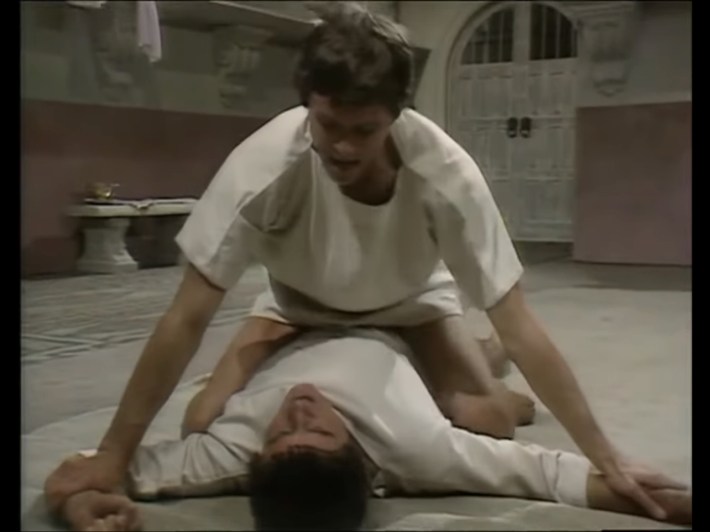
It's hard not to like Drusus. You meet him when he's in the gym with his brother, playing catch with a heavy ball, then horsing around with some greco-roman wrestling.
You hear the sweet way he tells Tiberius of the older man's excellent reputation among the men he used to command, who say "his drills were bloodless battles, and his battles bloody drills." Bars. (Credit for the turn of phrase, as best I can tell, goes to the Jewish writer Josephus, a former soldier who'd been on the receiving end of Rome's military might before switching sides.) The two brothers even shave each other's backs, which to me is the equivalent of two dozen trust falls.
Drusus himself now occupies the command of the German legions Tiberius once oversaw. He's a fine and honorable soldier as best we can tell, and a friend to Augustus as well. But while he serves the Empire, he's no fan of it, nor of the all-powerful position it's built around. In a letter to his brother after he returns to the front, Drusus writes of his worries:
A period of enforced rest due to a slight head wound has given me much time to ponder and reflect on the state of our beloved Rome. Such was the extent of the corruption and petty place-seeking that I found in Rome, that I have come to the conclusion that it is the inevitable consequence of the continued exercise of supreme power by Augustus.
The problem with building an enormous, largely unaccountable apparatus of power around one person, however good a guy he is, that power will eventually be inherited by someone who's not such a good guy. Okay, so today we're legalizing same sex marriage and talking about how the moral arc of the universe bends towards justice. That's nice. We'll get Shep Fairey to make a poster.
But what happens tomorrow? Perhaps the council of black-robed wizards who decide whether laws are legal or not will one day be dominated by right-wing lunatics. Perhaps the person placed at the apex of the richest and mightiest nation in human history will one day be a senile Nazi with an axe to grind against anyone who's ever wronged him. Every opportunity we had to undermine the power of these institutions and didn't take it was a waste of good fortune and a crime against the future.
Drusus already senses these problems arising, even with Augustus still on the throne. In argument with his mother, who resents both Drusus and her first husband for harboring hopes for the return of the Republic, Drusus asks her if she wants Rome to be reduced to the open corruption of "the Eastern potentates," upon which their civilization had always looked down. He sees how quickly these things fall apart, even with someone decent at the top.
And he dies for it. At least, I think he does. Unfortunately, Augustus and Livia hear the contents of Drusus' letter, after Livia forces the towering Tiberius to read it aloud to them like a naughty schoolboy caught passing notes. They dispatch a letter asking him to return to Rome … and Livia's personal physician, to treat his head wound.
Unfortunately, this means Livia's doctor is in charge when Drusus incurs a gnarly-looking leg wound, and with that his doom is sealed.
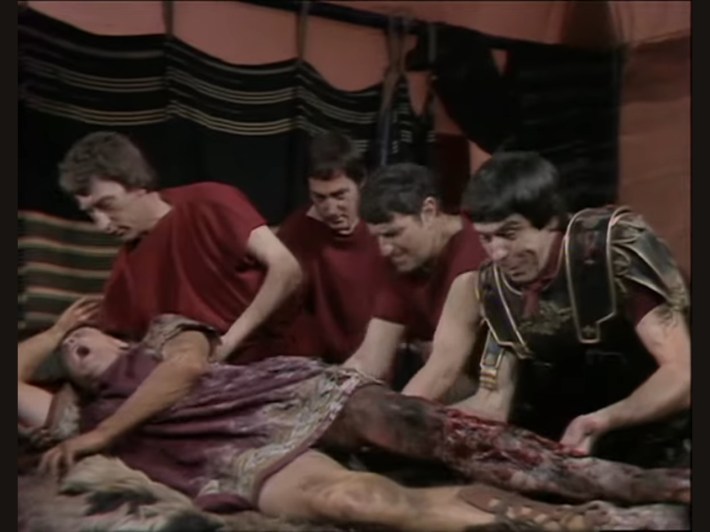
Drusus dies with a very important person in his arms. Not his brother, who's there by his side as he does. Not his wife Antonia (Margaret Tyzack), who's there too. No, it's his baby boy, Claudius, who has entered the scene at last, bawling at full blast.

Is Drusus Livia's latest victim? The circumstantial evidence all points in that direction. Her doctor, Musa, was not in on the scheme to poison Marcellus in Episode 1, which gives me pause, but that was a decade ago by this point in the story and his tune may have changed after that long in Livia's service. Meanwhile, she disliked Drusus personally and loathed him politically; he was quick to point out that she was perhaps the only person keeping Augustus from retiring and restoring the Republic unilaterally because she enjoyed the power she exercised through him.
What's more, the episode begins by dropping the tidbit that in addition to killing Marcellus last episode, she later murdered his rival — and the second husband of Marcellus' widow, Augustus' sybaritic daughter Julia — Marcus Agrippa, too. And it ends by heavily implying she's on the verge of killing Julia's sons too, in order to completely clear the playing field for Tiberius.
Ah, Tiberius. Now we get to it the dramatic heart of the episode: George Baker's growlingly unhappy emperor-in-waiting. Baker is like many actors on this show in that he is asked to play his character as a significantly younger — and/or older in some cases — man than himself, with only the script's context and some theatrical wigs and stage makeup to help us determine his age as we watch. You don't necessarily look at the guy and think "guy in his early-to-mid-30s who's nursing a massive years-long heartbreak over the collapse of his marriage to his one true love."
But you get it by the end of the episode, that's for sure. Ever since Livia and Augustus forced Tiberius to dump his beloved wife Vipsania (Sheila Ruskin), to whom he was happily married and utterly devoted, for Marcellus' and Marcus' widow Julia, whom he despises, he's been miserable. Julia spends her free time mocking Vipsania's boyish figure and making shockingly ribald jokes about Tiberius' need to hit it from behind with her.
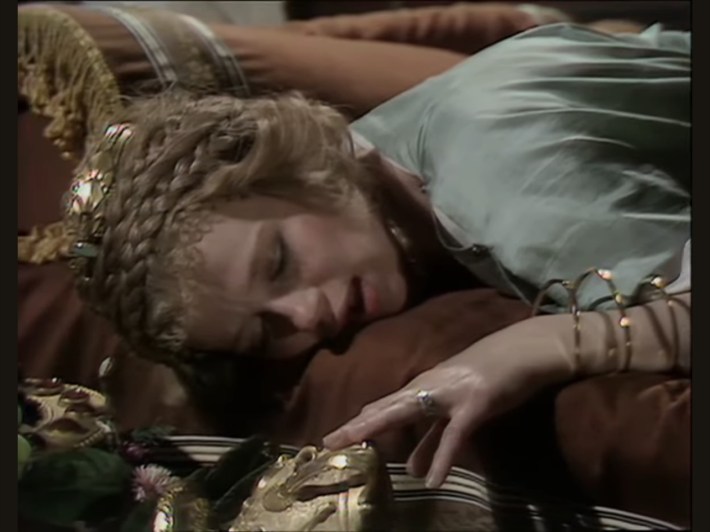
And Tiberius can't let Vipsania go. He sneaks off to see her in a tremendously hot scene set in the shadowy confines of her house. Vipsania is preparing to remarry, and Tiberius is in full if I can't have you no one will mode until his ex reminds him that he got the divorce, not her. "They made me do it," he whines.
"They couldn't have made me do it!" she retorts, and he knows she's got him dead to rights. We've seen time and again how he ensures his own "darkness inside," as he puts it to Drusus, by going along with what he knows to be wrong. He even worries that if he were to lose Vipsania, he'd become someone terrible without her kindness to keep him in check.
The entire Tiberius/Vipsania/Julia love triangle is dramatic dynamite. It gives Baker an opportunity to turn his unpleasant, uncharismatic character into the series' biggest romantic to date, but in a way that feels as hard-edged as anything else the show has done. It echoes his similarly doomed love for his brother, both brought to an end by the apparent machinations of his own mother. It gives Julia the chance to get an anal sex joke onto the BBC and PBS.
And it gives us another chance to see the way Augustus' "hey man, I'm just a regular guy like you, I understand you have needs" routine carries with it an implicit threat that he himself might no longer even realize is there: When this man smirks at you, shakes his head, and simply says "I don't like it" regarding your affair, keeping it up may be signing your own death warrant.
Tiberius gets lucky and only gets banished, though it takes him hitting Julia, Augustus' daughter, before the Emperor finally issues the order. Again, Augustus tries to see the best in people, and only acts harshly when he feels his hand has been forced. But nothing's stopping him from acting harshly just for the hell of it. And let's say Tiberius does wind up in the Imperial seat. What if he's right to be afraid of the man he'll become without Vipsania in his life? What if Livia continues to do her dirty work through all of them? When supreme power has been granted, what's to stop someone evil from exercising it?
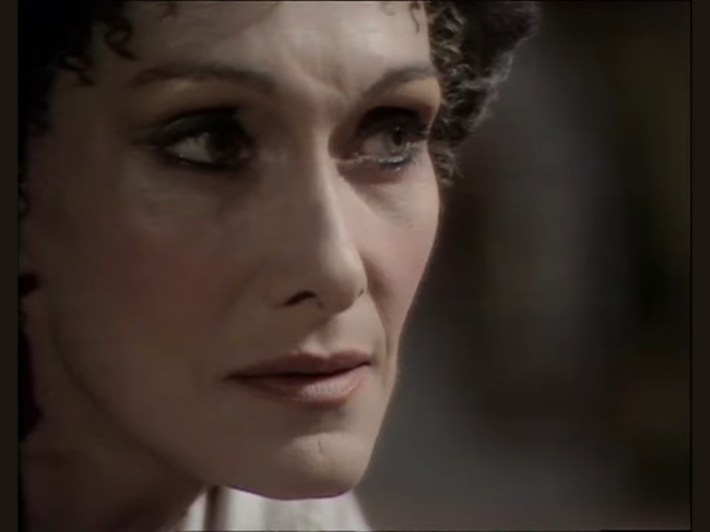
This recap was originally accessible to paid subscribers only, and future recaps in this series are available now for paid subscribers. If you haven't already, consider supporting worker-owned media by subscribing to Pop Heist. We are ad-free and operating outside the algorithm, so all dollars go directly to paying the staff members and writers who make articles like this one possible.
